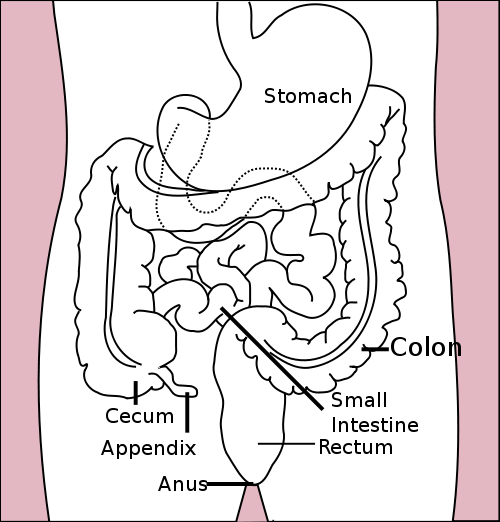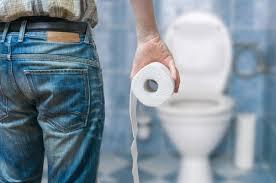Diarrhea After Eating
What Is Diarrhea After Eating?
If you experience diarrhea after having a meal, you could be suffering from postprandial diarrhea (Diarrhea After Eating). Postprandial diarrhea can be acute or chronic.
Some people may have postprandial diarrhea accompanied by painful bowel movements and with this type of diarrhea, it will most likely resolve after emptying the stomach. While this condition is common, it can be difficult to diagnose. At times, postprandial diarrhea could be a symptom for another underlying conditions. 1,2,3

Location of Intestinal Organs
For instance, you may have a diarrhea if you have irritable bowel syndrome and this is called IBS- diarrhea. Therefore, postprandial diarrhea in this case is seen to be a symptom of irritable bowel syndrome.
At other times, postprandial diarrhea could occur with no diagnosable reason. It is important you work with your doctor to find out what may be causing you to have diarrhea after you have taken a meal.
Causes
Some people will have acute postprandial diarrhea in which case there is a brief bout of the condition, and it doesn’t occur all the time- it’s occasional and in most cases, unexpected. This may resolve on its own or sometimes you may require medication. There are many things that could cause this kind of diarrhea and they include:
Food poisoning
If you take food that has been contaminated with microbes, the body may detect that and begin to expel it. The diarrhea comes a few minutes after eating the bad food.
Viral infections
If you have vital infections, they could lead to temporary postprandial diarrhea. The infection makes the digestive tract to be more sensitive and the diarrhea could persist for a few days even when other symptoms have disappeared.
Intolerance to lactose
Some people have allergy to lactose. Lactose is a kind of sugar you find in dairy products. If you take food that contains lactose and you are lactose intolerant, you may have symptoms such as abdominal cramping, bloating, and diarrhea.
Toddler’s diarrhea
It is common for infants and young children who take a lot of fruit juice to experience postprandial diarrhea. Having high amounts of sugar in fluids and drinks taken by babies may draw water into the baby’s bowels. This, in turn, causes watery stools and diarrhea.
Sugar malabsorption
Similar to lactose intolerance, sugar malabsorption is where the body is unable to absorb sugars such as fructose and lactose. When the sugars make their way to the intestine, it could result in gastrointestinal problems such as diarrhea.
Magnesium overdose
While it may be difficult to have excess magnesium in body, it can happen if you are taking supplements, and this may result in a diarrhea.
Parasites
If you are infected with food borne parasites such as tapeworms, it may cause you to have postprandial diarrhea. The symptoms of tapeworms in body including the diarrhea will last until when that parasite dies or is removed through de-worming medications.
Food allergy
People who experience food allergies may have symptoms like stomach pain, diarrhea, vomiting, and feeling of nausea. Other symptoms may be nasal congestion, asthma, and skin rashes. The allergy may cause inflammation to occur in the small intestines. Foods such as milk, eggs, nuts, soy, wheat, shellfish, and fish may cause food allergies in some people.
Symptoms
You may have chronic postprandial diarrhea due to a number of causes which include:
Irritable bowel syndrome
This is a disorder, which causes various gastrointestinal issues. Symptoms of irritable bowel syndrome include bloating, gas, abdominal cramping, and diarrhea. It is not clearly understood why IBS occurs.
Bile acid malabsorption
The bile juice is produced by the liver and stored in the gallbladder where it’s released to the small intestines where it helps emulsify or break down fats. When the bile or gall juice is not adequately reabsorbed into the body system, it may cause the intestines to become irritated resulting in watery stool and diarrhea.
Celiac disease
It is an autoimmune disorder, which brings about damage to the intestines every time you take gluten. You may experience diarrhea after eating gluten. Gluten is a kind of protein that is contained in wheat products.
Microscopic colitis
With this condition, it makes the large intestine to be inflamed. Symptoms of microscopic colitis are such as gas, abdominal cramps, and diarrhea. The inflammation may not always be present meaning that the symptoms of postprandial diarrhea may come and go.
Dumping syndrome
Although not common, complications linked to weight loss surgery could result in postprandial diarrhea. Dumping syndrome makes the stomach to empty quickly immediately you have taken a meal. The condition triggers reflex responses that help manage the bowel movement and therefore diarrhea may occur more often.
Gallbladder removal
If your gallbladder has been removed, it may cause you to have frequent diarrhea within the first few weeks or even months following the surgery. The diarrhea will stop with time but in some people, it may continue and become chronic after they have the surgery.
Postprandial Diarrhea Syndrome in IBS Cases
Emerging new theories suggest that there could be something else going on among patients who are diagnosed with irritable bowel syndrome diarrhea. While the studies may be in their preliminary phase, the theories are opening doors for novel, effective treatments of this condition.
Dr. Money and Dr. Camilleri who are renowned researchers in the area of IBS, have pointed out three possible causes for postprandial diarrhea syndrome. Although diagnosis markers seem to be limited, these researchers are suggesting that positive treatments of these theoretical problems could be a means of confirmation of the diagnosis. The three diagnoses, which should be considered are:
Bile Acid Malabsorption
During digestion the body secretes bile acids into the small intestine. These bile acids help in breakdown of fats. Suggested theories hold the view that when the bile acids aren’t properly absorbed back to the body, the excess amounts will be flushed out and they enter the large intestine.
This results in secretion of fluid into the large intestine thus contributing to watery stools, which may cause diarrhea. Many health problems can result in bile acid malabsorption, for example, congenital defects, digestive disease, and post-surgery consequences.
Pancreatic Exocrine Insufficiency
When you talk of pancreatic exocrine insufficiency, it refers to a situation where the pancreas produces insufficient digestive enzymes to allow full digestion of food.
Glucosidase Deficiency
Glucosidase is a substance that helps in digestion of carbohydrates. While severe cases of genetic glucosidase deficiency may be rare, Dr Money and Dr. Camilleri point out that more mild deficiency in glucoamylase, isomaltase, maltase, sucrose, and a-glucosidases could lead to symptoms of postprandial diarrhea.
The two doctors have the view that having deficiency in these substances may explain the problems that many patients with IBS have with some trigger foods.
There are other theories that suggest the causes of postprandial diarrhea in patients and they include – excessive gastric acid and small bowel water content.

Symptoms Associated with Diarrhea After Eating
If you are having diarrhea after you take meals, there may be other symptoms you could be experiencing. You want to pay attention to what kind of symptoms accompany your bowel issues to help your doctor in diagnosing this form of diarrhea. Among the symptoms that come with diarrhea after eating are:
- A yellowish diarrhea when you have eaten and this may indicate there is a problem with your gallbladder.
- Having black feces may indicate that some blood has been digested, which means you may have bleeding occurring in the upper part of the gastrointestinal tract.
- Having bright red blood in diarrhea may mean you have bleeding occurring in the lower part of the gastrointestinal tract.
- Having a fever accompanying the diarrhea may indicate an infection
- If you vomit, it could indicate the presence of some infection
- An episode of bloating could mean you have IBS, bacteria cases, or some other digestive disorders.
- If you have abdominal cramps and pain, it may suggest an illness or IBS.
- Having dry mouth and skin or excessive thirst, dizziness, weakness, and dark urine or minimal urine could be signs of your body being dehydrated, and therefore you should get treatment as soon as possible.
Treatment of Postprandial Diarrhea
Treatment of diarrhea after eating is aimed at addressing the factors or things that trigger it. The treatment may also aim at easing the symptoms of postprandial diarrhea. Among the treatment options available include:
Hydration
In any form of diarrhea, the most important thing is to ensure the patient remains hydrated. Diarrhea causes an individual to defecate before sufficient fluids have been reabsorbed back into the body. After diarrhea, a patient should take fluids at least a cup of liquid. The fluids may include water, flat ginger ale, clear fruit juice, soup broth, and some other fluids. You should avoid taking alcohol because it causes dehydration.
Medication
If you have an infection or food poisoning, you may be prescribed an antiviral, antibiotic, or an antiparasitic medicine to help treat the infection. There are OTCs that are used to treat diarrhea and they include drugs like Pepto-Bismol. However, in case of an infection, such medications may not be appropriate.
If diarrhea is occurring due to food poisoning, the body may try to expel those pathogens so, it may be necessary to allow it happen. Taking medication for diarrhea could worsen other infections or medical conditions a patient may be having. You want to see a doctor if you have diarrhea before you use any kind of anti-diarrhea treatment.
Medications such as bile acid binders may be used to treat bile acid malabsorption, which may be causing postprandial diarrhea. These medications include – cholestyramine, colesevelam, and colestipol.
Use of pancreatic digestive enzymes
Patients with postprandial diarrhea may also benefit from pancreatic digestive enzymes like pancrelipase (PES).
Taking gentle foods
The bowel could become sensitive after you have diarrhea particular if it has been caused by food poisoning. You can ease the gut by taking easily digestible foods or starting with semi-solid foods such as soup, soda crackers, and toast.
Relaxation exercises
You may want to calm the body through exercises. There is close connection between the gut and brain and when an individual is stresses out, it could trigger or worsen an episode of diarrhea. Exercises like deep breathing and progressive muscle relaxation may help calm the body therefore slowing down your bowel movements.
Reference List
- What Causes Diarrhea After Eating? Available at https://www.verywell.com/diarrhea-after-eating-1944811
- Diarrhea After Eating: Why It Happens and How to Stop It. Available at http://www.healthline.com/health/digestive-health/diarrhea-after-eating
- Constant Diarrhea After Eating. Available at http://www.livestrong.com/article/381718-constant-diarrhea-after-eating/
- What Causes Diarrhea After Eating? Available at http://www.healthhype.com/what-causes-diarrhea-after-eating.html
- Diarrhea after Eating: Causes and Natural Treatments. Available at http://www.doctorshealthpress.com/general-health-articles/diarrhea-after-eating/
